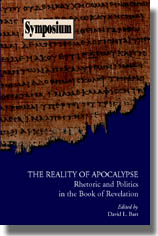SBL Press Bookstore

The Reality of Apocalypse: Rhetoric and Politics in the Book of Revelation
David L. Barr
ISBN
9781589832183
Volume
SymS 39
Status
Available
Price
$37.00
Publication Date
August 2006
$37.00
Far from spinning a fantasy of what will never be, the book of Revelation depicts an alternate social world in order to shape the community and individual identity of an audience living under imperial rule. To highlight the Apocalypse’s meaning for its original audience, this volume focuses on two interrelated themes pulsing throughout Revelation: rhetoric and politics. It considers rhetorical strategies and tactics in Revelation and demonstrates how its rhetoric fits the situation in Roman Asia Minor and the struggle within the Apocalypse community. It also examines community and cultural conflicts, showing how myth, symbol, and liturgy function as means of resistance in an imperial setting. By offering a fresh window on the lively interplay between imagination and history, between words and worlds, this volume will be indispensable for anyone seeking to understand current scholarly analysis of the book of Revelation.
David L. Barr is Professor of Religion at Wright State University in Dayton, Ohio. He is the author or editor of numerous books, includingReading the Book of Revelation: A Resource for Students (Society of Biblical Literature) and Tales of the End: A Narrative Commentary on the Book of Revelation (Polebridge).
Reading the Apocalypse as Apocalypse: The Limits of Genre
—Gregory L. Linton
Apocalypse Renewed: An Intertextual Reading of the Apocalypse of John
—David E. Aune
Beyond Genre: The Expectations of Apocalypse
—David L. Barr
Hearing and Seeing but Not Saying: A Rhetoric of Authority
—Jean-Pierre Ruiz
To Rejoice or Not to Rejoice? Rhetoric and the Fall of Satan in Luke 10:17–24 and Rev 12:1–17
—Edith M. Humphrey
Sarcasm in Revelation 2–3: Churches, Christians, True Jews, and Satanic Synagogues
—Steven J. Friesen
The “Synagogue of Satan”: Crisis Mongering and the Apocalypse of John
—Paul Duff
Revelation and Empire: Symptoms of Resistance
—Greg Carey
Dragon Myth and Imperial Ideology in Revelation 12–13
—Jan Willem van Henten
The Lamb Who Looks Like a Dragon? Characterizing Jesus in John’s Apocalypse
—David L. Barr
Betwixt and between on the Lord’s Day: Liturgy and the Apocalypse
—Jean-Pierre Ruiz
The Rhetoricity of Revelation and the Politics of Interpretation
—Elisabeth Schüssler Fiorenza
David L. Barr is Professor of Religion at Wright State University in Dayton, Ohio. He is the author or editor of numerous books, including
“This is an important, if at times technical, collection representing the work of significant North American Revelation scholars, giving a flavour of the way the land lies. Professional scholars and graduate students of Revelation will find plenty here to stimulate further reflection and debate.”
— Ian Boxall, Journal for the Study of the New Testament
CONTENTS
Part 1: Rhetoric and Reality
Reading the Apocalypse as Apocalypse: The Limits of Genre
—Gregory L. Linton
Apocalypse Renewed: An Intertextual Reading of the Apocalypse of John
—David E. Aune
Beyond Genre: The Expectations of Apocalypse
—David L. Barr
Hearing and Seeing but Not Saying: A Rhetoric of Authority
—Jean-Pierre Ruiz
To Rejoice or Not to Rejoice? Rhetoric and the Fall of Satan in Luke 10:17–24 and Rev 12:1–17
—Edith M. Humphrey
Sarcasm in Revelation 2–3: Churches, Christians, True Jews, and Satanic Synagogues
—Steven J. Friesen
Part 2: Politics and Reality
The “Synagogue of Satan”: Crisis Mongering and the Apocalypse of John
—Paul Duff
Revelation and Empire: Symptoms of Resistance
—Greg Carey
Dragon Myth and Imperial Ideology in Revelation 12–13
—Jan Willem van Henten
The Lamb Who Looks Like a Dragon? Characterizing Jesus in John’s Apocalypse
—David L. Barr
Betwixt and between on the Lord’s Day: Liturgy and the Apocalypse
—Jean-Pierre Ruiz
The Rhetoricity of Revelation and the Politics of Interpretation
—Elisabeth Schüssler Fiorenza
